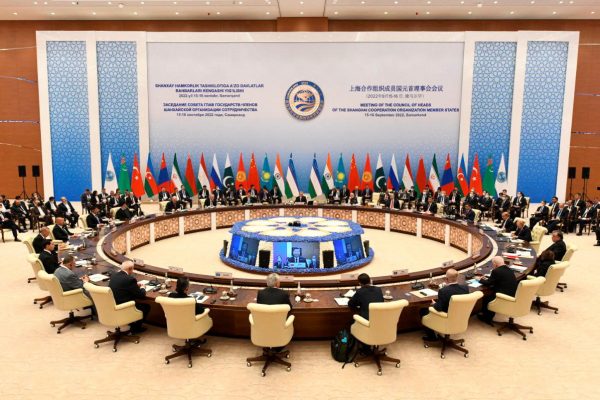The SCO hosted the leaders of Russia, China, India, Kazakhstan, Kyrgyzstan, Pakistan, Tajikistan and Uzbekistan, and SCO observer states Iran, Afghanistan, Belarus and Mongolia. Dialogue partners like Armenia, Azerbaijan, Cambodia, Nepal, Sri Lanka and Turkey, alongside a few candidates for dialogue partner status, also attended. The President of Turkmenistan, Serdar Berdimuhamedow, was the personal guest of Shavkat Mirziyoyev, the President of Uzbekistan.
Hosting the summit of the world’s largest regional organisation, which covers 40 per cent of the world’s population and more than 30 per cent of global GDP, has a special connotation.
The meeting took place amid the Russian military campaign in Ukraine, unprecedented Western sanctions against Russia, growing tensions between the West and China and at a time when international political cooperation is difficult. The recent military confrontation between Azerbaijan and Armenia and clashes on the Kyrgyzstan–Tajikistan border demonstrate the importance of the meeting in dealing with the challenges of member states.
The summit featured varying agendas from Russia, China and a majority of smaller participants. Russia attempted to use the summit to break out from international isolation. It signalled to its neighbours and close allies, such as China, that the SCO is an instrument through which to change the Western-run international order.
Support for Russia’s agenda differed between certain countries, with Turkey, China and Iran displaying some degree of understanding. India’s agenda focussed on its concern about the impacts of the Ukrainian war on the world economy. Chinese President Xi Jinping attempted to balance China’s support for this ‘new’ international order with co-existence with the West due to ongoing Western economic influence over the Chinese economy.
Most Central Asian states and summit participants see the SCO as holding untapped economic potential rather than being an organisation solely designed to deal with security issues. The 2022 summit featured an attempt by member states to transform the SCO into an organisation with clear economic and infrastructure-oriented goals. These goals include promoting new transportation routes, diversifying connectivity channels, securing the stability of supply chains and promoting wider opportunities for growth generation.
The suggestions all had an angle of humanitarian relief and environmental disaster prevention — emphasised particularly by Uzbekistan. Russia also suggested establishing an association of sports organisations. These initiatives will pave the way for the SCO to become a regional organisation with greater focus and inclusivity. The agenda of most of the smaller participating states also reflected support for widening the geographic scope of the organisation. This will pave the way for the inclusion of Iran and Belarus into the organisation, while also offering dialogue partnerships to Bahrain, the Maldives, Kuwait, the United Arab Emirates and Myanmar.
The memorandums of understanding recently signed between the SCO and the League of Arab States, the Economic and Social Commission for Asia and the Pacific and UNESCO aided the agenda of Uzbekistan and other regional states. The memorandums are supposed to transform the anti-western image of the SCO into a more inclusive and open regional grouping.
The presence of Vladimir Putin and Xi Jinping inevitably led to discussions about the role of the SCO in managing the Russia–China rivalry in Central Asia and competition with the West for regional influence. But Central Asian states wanted to discuss constructing a safe neighbourhood, promoting sustainable development, strengthening transport connectivity and facilitating deeper cultural dialogue.
The summit yielded several outcomes. SCO members signed an agreement on good neighbourliness, friendship and cooperation for 2023–2027. The Samarkand Declaration then outlined a joint approach to cooperating in science, technology and innovation to transform the region from the site of an environmental and humanitarian crisis to a place of green innovation and technology.
In the lead-up to the summit, SCO member states emphasised the importance of rebuilding Afghanistan and incorporating Iran into regional initiatives to create a more inclusive neighbourhood. The agreement to construct a road between China, Uzbekistan and Kyrgyzstan sends a message that the SCO is becoming a regional organisation with multiple developmental goals rather than a political bloc.
Changing the organisational identity of the SCO to a more functional and issue-specific arrangement is instrumental for the organisation to reflect the concerns of its member states. If successful, this change will signal to the international community that the SCO’s understanding of security goes beyond borders and policing — the goals of the 2001 summit.
The SCO agenda now includes improving the wellbeing of its joint citizenry and maintaining the connectivity of its members to world markets. The broadening of its agenda will safeguard smaller members against attempts by larger members, such as Russia and China, to hijack the SCO’s organisational agenda and identity.
Timur Dadabaev is Professor of International Relations and Director of the Program for Eurasian Studies at the University of Tsukuba.

